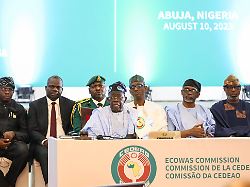Use in Niger possible
West African countries set up a reaction force
08/10/2023, 9:40 p.m
West Africa may face another military conflict after the coup in Niger. The countries in the region are considering drastic steps against the junta, and an intervention force is being put together. Efforts to find a peaceful solution are said to have priority, but the organization is keeping “all options” open.
The West African community of states ECOWAS has decided to set up an intervention force “immediately” for a possible deployment in Niger. This should restore the constitutional order in the country after the military coup, according to the final declaration, which the President of the ECOWAS Commission Omar Touray read out after a summit of heads of state in Nigeria’s capital Abuja. The organization, which includes 15 states in West Africa, is keeping “all options” open, it said. However, the priority is to restore the constitutional order by peaceful means.
ECOWAS spoke of deploying the intervention force, but left a lot open. The composition of the force and a possible timetable for a deployment in Niger remained unclear. The announcement seemed designed to keep up the pressure on the new military rulers – without immediately creating military facts.
In his closing speech at the summit, the president of the regional and military heavyweight Nigeria, Bola Tinubu, had once again called for a peaceful solution to the conflict with the military junta. At the same time he emphasized: “No option is taken off the table. This also applies to the use of force. As a last resort.”
Junta appoints new government
ECOWAS also again condemned the “illegal detention of President Mohamed Bazoum” and the conditions under which the ousted President and his family are being held by the junta. The group called on the international community to support any further steps by ECOWAS needed to restore constitutional order.
The group also decided to maintain all sanctions against Niger. At its first meeting on July 30, the economic community suspended trade and financial transactions, closed the borders of neighboring countries with Niger and ordered central banks to freeze assets of Nigerien state and semi-state companies and the military involved in the coup. Nigeria also stopped supplying electricity to Niger, which the neighboring country needs.
On July 26, Niger’s Presidential Guard under General Abdourahamane Tiani arrested the democratically elected President Mohamed Bazoum in his residence because, according to observers, Bazoum wanted to replace Tiani at the head of the elite unit. After initial speculation of an internal power struggle, the other branches of the armed forces also joined the coup, proclaiming “the end of the regime” and dissolving all constitutional institutions. Tiani took power. Under the chairmanship of Tinubu, ECOWAS threatened measures up to and including a military intervention shortly after the coup. Meanwhile, the junta in Niger named a government of 21 military and civilians on Thursday night.
